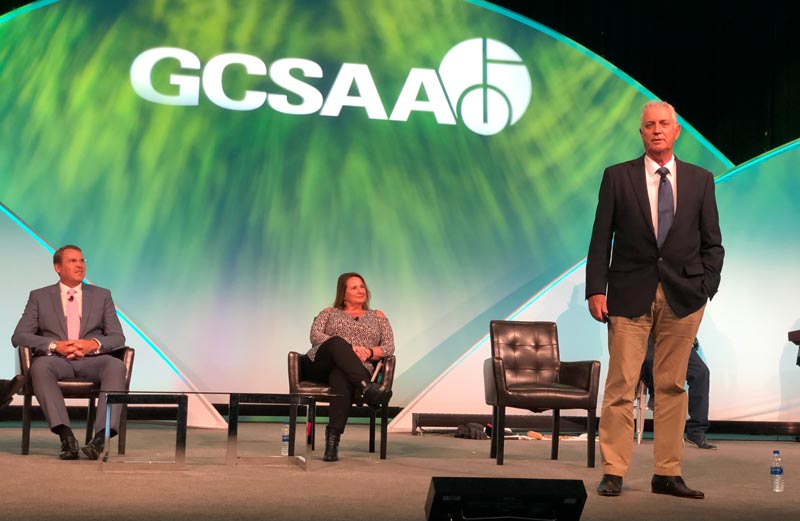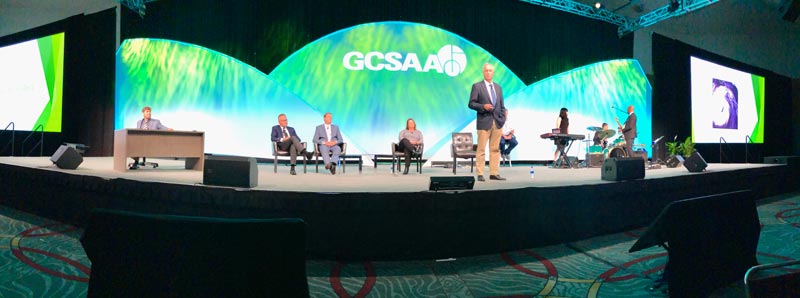
Forty-year GCSAA member Tim Hiers, CGCS, (right) shares his story of post-hurricane revival of a golf course during the Turfgrass Talk Show on Monday, Feb. 4. Also pictured are Andy Johnston of Sentosa Golf Club in Singapore and Nancy Dykema from Michigan State University. Photos by Roger Billings
This year’s Turfgrass Talk Show at the Golf Industry Show— hosted by Thom Nikolai, Ph.D., of Michigan State University, with special guest Nancy Dykema from the university’s Department of Plant, Soil and Microbial Sciences — showed that where there’s a will, there’s a way, and that, given the right resources, managers can turn proverbial lemons into lemonade.
All three presenters had faced what seemed to be overwhelming odds, and faced them with perseverance and ingenuity. The general manager and director of agronomy at Singapore’s Sentosa Golf Club is Andy Johnston, who first worked at Sentosa on the redesign of the course in 2006; Paul Armitage is the general manager of Le Golf National in Paris, the host of the 2018 Ryder Cup; and Tim Hiers, CGCS, is the director of course operations at White Oak Properties in Yulee, Fla.
In 2010, Sentosa Golf Club reached out to Johnston because the club needed a new superintendent just 60 days before the prestigious Singapore Open. Johnston arrived to discover that the course owned 12 utility vehicles, only six of which were operational, and, in general, needed a lot of work. Johnston took the reins, and with new equipment and a new attitude, he was able to bring the club up to the level needed for the Open.
In 2011, with new superintendent, Rodney McKeown, Johnston continued to revamp the course and change its culture. (Johnston refers to the superintendent as “the most important person at the golf club.”) Signs around the course remind staff that “This is not a practice round; the tournament is today,” meaning that the course is ready for tournament play 365 days a year.
Johnston says leaders must be the first on the job and the last to leave. Such commitment gets the necessary buy-in from the team. During Johnston’s tenure, Sentosa, which hosted four major tournaments in 2018, has been named one of Golf Digest’s top 100 courses in the world.
Paul Armitage faced similar challenges in preparing Le Golf National for the 2018 Ryder Cup. The course, which was completed in 1990, was built as the facility for the French Golf Federation as a home or the French Open, but it was poorly managed and sloppily maintained when Armitage arrived in 2014.

Preparation for the Ryder Cup required a new culture at the club. Employees who were unwilling to adapt to the new standards and management style were replaced. Much-needed new equipment was purchased, some bilingual employees were hired, and a new business model was introduced with a new price structure. Two new lakes and four new pro tees were added. Ultimately, the course was transformed and will be hosting the Olympics in 2024.
Unlike the other speakers, Tim Hiers faced a natural disaster: a hurricane. Like the other speakers, Hiers realized that the core of any organization is its employees, and they should come first. If you take care of the employees, they will take care of you. (The membership at Hiers’ course raised a significant amount of money to assist employees affected by the hurricane.)
Once employees were able to return to work, the course was open within four days. Hiers suggested that superintendents have plans in place and have practice drills to prepare for natural disasters, as no place is immune. After an event occurs, they should not attempt to walk the course until it is absolutely safe to do so. And when replanting, superintendents should choose plantings that are more suitable for their particular microenvironment. Hiers also said that superintendents who have had similar experiences are able to offer the best advice. Above all, don’t quit, and never stop asking questions. Hiers said he did find some benefits in the storm — it thinned the trees and reduced the number of roots that were intruding in paved areas.
On a final note, Roch Gaussoin, Ph.D., of the University of Nebraska-Lincoln, won the 2019 Joke-a-Thon against Brandon Horvath, Ph.D., of the University of Kentucky, and Mike Fidanza, Ph.D., of Penn State.
Teresa Carson is GCM’s science editor.